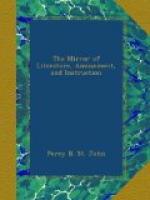In this case the man has performed the part of a ventriloquist, in so far as he imitated accurately the accents of the child; but the auditor could not long be deceived by such a performance. If the man either hid his face or turned his back upon the auditor when he was executing his imitation, a suspicion would immediately arise, the auditor would attend more diligently to the circumstances of the exhibition, and would speedily detect the imposition. It is absolutely necessary, therefore, that the ventriloquist shall possess another art, namely, that of speaking without moving his lips or the muscles of his face: how this is effected, and how the art is acquired, we do not certainly know; but we believe that it is accomplished by the muscles of the throat, assisted by the action of the tongue upon the palate, the teeth, and the inside of the lips—all of them being movements which are perfectly compatible with the immutability of the lips themselves, and the absolute expression of silence in the countenance. The sounds thus uttered are necessarily of a different character from those which are produced by the organs of speech when unimpeded, and this very circumstance gives double force to the deception, especially when the ventriloquist artfully presents the contrast to his auditor by occasionally speaking with his natural voice. If he carries in his hand those important personages Punch and Judy, and makes their movements even tolerably responsive to the sentiment of the dialogue, the spectator will be infinitely more disposed to refer the sounds to the lantern jaws and the timber lips of the puppets than to the conjurer himself, who presents to them the picture of absolute silence and repose.
Mr. Dugald Stewart, who has written an interesting article on ventriloquism in the appendix to the third volume of the “Elements of the Philosophy of the Human Mind,” has, we think, taken a very imperfect view of the subject. He not only doubts the fact, that ventriloquists possess the power of fetching a voice from within, but “he cannot conceive what aid the ventriloquist could derive in the exercise of his art from such an extraordinary power, if it were really in his possession.” He expresses himself “fully satisfied, that the imagination alone of the spectators, when skilfully managed, may be rendered subservient in a considerable degree to the purposes of the ventriloquist;” and he is rather inclined to think, that “when seconded by such powers of imitation as some mimics possess, it is quite sufficient to account for all the phenomena of ventriloquism of which we have heard.”




